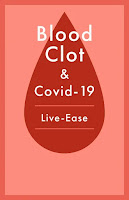Blood clot & Covid-19
The virus COVID-19 and its mutants have
given rise to several other diseases in human community. The human is confused
about how to face them? Or should say what to face now? The sudden rose of
fungal infection and now blood clots formation are serious issues.
What is a blood clot?
Clotting of blood is something that is
inbuilt in body so as to face injuries and protect them from foreign agents.
When any blood vessel gets injured or any
accident leads to some kind of wounds on body externally, than there are
certain proteins are produced which attracts the clotting factors, so as to
build-up a layer of dried blood cells over the injury or wound.
This function of blood cells clumps them
together which forms a clot and helps the wound to heal further without any
interruptions.
Is clotting could be dangerous?
Yes, when the clotting of blood happens in
the absence of any kind of wound or injury or should say when the human immune
misunderstand the foreign material and starts activating the clotting cells, it
behaves dangerously for human body.
The clotting of blood could restrict the
flow of blood when takes place in blood vessels.
The capillaries in human body are the
smallest blood vessels; they are so small in radii that even the blood cells
need to pass through them in a single fine line. Clot in them could lead to
serious conditions as their size and number are impossible to be handled.
Blood clotting related to COVID-19. How?
Clotting of blood is another risk posed by
the corona virus. The severe inflammation due to COVID-19 triggers up the
clotting system of human body and makes it active.
Here, the human immune misunderstands the internal injuries caused due to the corona virus and starts the clotting of blood treating it as some infection and thus the higher the inflammation and widespread is the clotting.
This clotting blocks the pathways of blood, oxygen
and other necessities which lead to several severe conditions like stroke or
attack.
The immobility of body and inflammation
favoured with weak immune creates perfect environment for blood clots in other
parts like legs or lungs.
What are the symptoms of blood clots?
While very disease show some signs of their
initiation, blood clots also give signs of their introduction in human body
parts. Some of the symptoms of blood clots are:
·
Weakness in limbs, it may
happen in single arm or leg.
·
Difficulty in speaking words
normally.
·
Any type of new swelling
anywhere in body.
·
Pain in chest.
·
Pain in radiating the neck.
·
Pain in jaw or back.
·
Shortness of breathe.
·
Facial drooping.
·
Discoloration in arms or legs.
Who are at high risk of blood clotting?
There are some patients already fighting
with any disease are always at high risk of other diseases too as their immune
is already weakened. Some of those diseases are:
·
Hospitalized ones.
·
Diabetics.
·
Obesity.
·
Heart disease.
·
High D-dimer levels.
·
COVID-19 pneumonia.
·
Cancer.
What the blood clotting may lead to?
The clotting of blood leads to life
threatening effects sometimes when remains untreated especially in COVID-19
patients. The clotting may lead to:
·
Damage to brain – When the
blood makes its clots in brain cells or blood vessels which are pathways for
brain.
·
Pulmonary Embolism – It happens
when some blood clots takes place in lungs and blocks the flow of blood to
lungs. Leading to decrease the oxygen levels and severe damage to lung tissues.
·
Stroke – The Transient
Ischmetic Attack or mini stroke may happen when the blood vessels to brain are
blocked.
·
Heart Attack – the blood flow
to heart is interrupted due to blockage and hence is the main cause of heart
attack.
·
May also cause severe damage to
gastrointestinal tract, kidneys or limbs.
What is the treatment for blood clots?
The researchers are still in their ongoing
studies about blood clots and its treatments.
While in serious conditions of clotting the
blood thinners are given to the patient, only if they are not at high bleeding
risk. The blood thinners help in preventing the existing clots from getting
large in size and also prevent the formation of new clots in human body, but
should be given with high precaution and proper dosage.
Apart from blood thinners, other
alternatives like compression socks or inflatable cushions are prescribed.
What are the preventions for blood clots?
There are some preventions, which may save
one or may increase the well being in some positive way of a patient or who was
a patient in near time. They are;
·
Stay active and mobile most of
the time.
·
Avoid smoking.
·
Prefer to loss weight if
needed.
·
Should know the side effects of
medications one is going through.
·
Side effects of hormone
replacement therapies should be known well in advance.
·
Proper diet and alertness are
most vital.
Let’s get well together, let’s heal
together from all these tough times and tough diseases.
Be Healthy. Be Safe. Be Alive.

